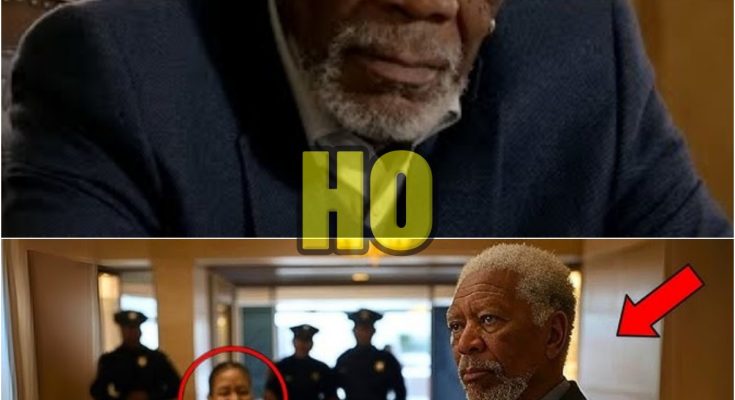The opulence of the Grand Maravel Hotel had always been an embodiment of the elite lifestyle—a glittering monument to wealth and status. Its marble floors gleamed beneath the soft glow of crystal chandeliers, while plush velvet chairs and exquisite artworks adorned the lobby, all contributing to the air of exclusivity that dominated the space. It was a sanctuary for the wealthy, a place where the well-heeled rubbed shoulders in their finest attire, discussing business deals and societal gossip in hushed tones.
Morgan Freeman, in stark contrast to the usual crowd, entered the lobby with a simple yet timeless elegance. He wore a worn leather jacket, faded jeans, and a navy sweater—humble attire compared to the designer suits that filled the space around him. Though his face was etched with the years of fame, wisdom, and life experience, it was his humility that caught the attention of a few guests. A woman, gasping softly in recognition, leaned over to whisper to her companion. Morgan, ever gracious, smiled faintly and nodded, but quickly shifted his gaze away to avoid drawing attention.

His presence was not disruptive, but it did not go unnoticed. As he approached the front desk, the receptionist—a young woman with icy blue eyes—looked up at him. Her professional smile froze for a moment as she scanned his appearance, the calm of the lobby momentarily disturbed by his presence.
“Yes, how may I help you?” she asked, her voice cordial but betraying a hint of coolness, a subtle shift in her demeanor.
Morgan smiled, setting his travel bag down on the floor. “Good evening, I would like to book a room for the night. I don’t have a reservation, but I’m happy to pay whatever is required.”
The receptionist hesitated for a brief moment. She glanced quickly at the screen and then back at Morgan, her smile growing more mechanical with each passing second. “I’m sorry, but we seem to be fully booked for tonight. There are no rooms available,” she said, her tone now sharper, as if unwilling to entertain further discussion.
Morgan raised an eyebrow, glancing around the vast lobby filled with guests. “No rooms at all?” he asked, his voice calm but tinged with confusion.
“Unfortunately, yes. We’re completely booked,” she replied, her tone curt, as if the matter was closed. But Morgan, used to these kinds of interactions, pushed on.

“That’s strange,” he said. “I’ve stayed here before without any problems finding a room.”
The receptionist’s eyes darted nervously to the screen again, and then she quickly turned to speak to the security guard stationed near the door. The tall, broad-shouldered man with the shaved head took notice of the exchange and began to move closer, his gaze fixed intently on Morgan.
Morgan, sensing something was amiss, turned to leave, but the guard’s steps grew closer. The receptionist, emboldened by his presence, repeated in a louder voice, “Sir, we cannot accommodate you tonight. You should try another hotel.”
The guard stepped forward and addressed Morgan. “Is everything all right here?” His tone was deep and authoritarian, and his gaze never wavered from Morgan.
“I’m not causing any trouble,” Morgan replied evenly, his patience beginning to wear thin. “I simply want to book a room.”
The security guard crossed his arms, his posture rigid. “If the hotel is fully booked, there’s nothing we can do. I suggest you move along.”
Morgan stood his ground, but the situation was escalating. The receptionist, now joined by the guard, seemed determined to remove him from the premises. “I’m sorry for the inconvenience, sir,” she added in a mechanical tone, almost dismissive.
Morgan took a step back, his shoulders sagging slightly under the weight of the rejection. He reached into his pocket to check his phone for alternate accommodations but was stopped by the security guard, who insisted, “You should leave the premises now.” The tension in the air was palpable.
As Morgan turned and walked toward the exit, the weight of the gazes following him made every step feel like a betrayal. He felt the sting of humiliation, the subtle glances and whispers of the guests who had witnessed the exchange, adding to the sense of exclusion that had been forced upon him. Stepping out into the cold night air, Morgan’s frustration simmered beneath the surface, but he did not allow it to show. He simply walked away, his mind replaying the events that had just unfolded.
For the next few hours, Morgan wandered through the city streets, drenched by the steady downpour. His thoughts were a whirlwind of anger and disbelief, but the storm outside mirrored the chaos inside his mind. He found a small park, where he collapsed onto a bench, the rain soaking through his clothes, his spirit weighed down by the evening’s events.

As the night stretched on, Morgan’s mind began to clear. He was not just any man who had been turned away from an upscale hotel. He was Morgan Freeman—a man who had fought and worked hard for everything he had. It was a name that stood for dignity, perseverance, and grace, and yet here he was, being treated with disdain and exclusion.
Something inside him snapped. He didn’t just want to let it go. He didn’t want to walk away in silence. This time, he would take action. His fingers hovered over his phone, and rather than calling his assistant for a solution, he dialed his attorney. He needed the information fast. The Grand Maravel Hotel was about to face the consequences of its actions.
The next few days were a whirlwind of behind-the-scenes maneuvering. Morgan’s legal team, financial advisors, and consultants worked tirelessly to uncover the hotel’s financial vulnerabilities. It wasn’t long before Morgan discovered that the Grand Maravel was part of a boutique chain owned by Fairmont Holdings, a company struggling with financial issues and a tarnished reputation. The hotel was one of their flagship properties, but it was bleeding money. As Morgan’s team dug deeper, they found evidence of discriminatory practices that had been swept under the rug in an attempt to save face.
By the fourth day, the deal was nearly done. Morgan had used his influence, his reputation, and his resources to negotiate the purchase of the hotel. The paperwork was signed, and just like that, the Grand Maravel was his.
His return to the hotel was nothing short of symbolic. This time, he wasn’t walking in alone. He arrived in a sleek black car, flanked by his lawyer, a public relations manager, and a small group of journalists. Cameras flashed as he entered the lobby, and the staff—once so dismissive—froze as recognition dawned. The receptionist, who had turned him away just days earlier, stood pale-faced as Morgan approached the front desk.
“I believe I’ll take that room now,” Morgan said, his voice calm but carrying a weight that silenced the whispers around him. Before the receptionist could stammer out an apology, the hotel manager—the same man who had sneered at Morgan earlier—approached him, his face drained of color.
“Mr. Freeman,” he said, his voice strained, “Welcome back. I wasn’t expecting…”
Morgan raised a hand to silence him. “I know. You weren’t expecting me to own this place,” he said.
The manager’s mouth opened and closed, but no words came out. Morgan’s message was clear: the tables had turned. The hotel that had humiliated him had now become his, and the weight of that moment wasn’t lost on anyone in the room.



